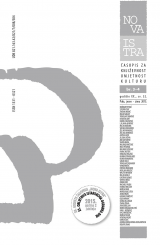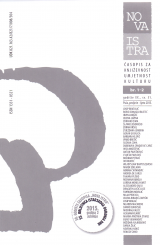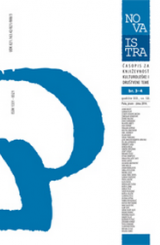Bremer Alida
ALIDA BREMER, born in Split in 1959. Studied Comparative Literature, German Philology, Romance Philology and Slavic Studies in Belgrade, Rome, Münster and Saarbrücken. Worked as a scientific associate at the German Department and as a Croatian and Serbian languages instructor at the Slavic Department in Münster and Gießen, where is currently a scientific associate at the Gender Studies Centre. Co-operates as an author and a translator with German and Croatian newspapers and journals, also with publishers; worked as a radio and TV translator, as well as a programme editor, translator and moderator at (many) literary events and book fairs. Published a great number of essays, scientific papers and translations. Earned her doctor's degree with the thesis on the post-modern detective novel (Kriminalistische Dekonstruktion. Zur Poetik der postmodernen Kriminalromane, 1999). Edited the collected papers Jugoslawische (Sch)Erben. Probleme und Perspektiven, 1999, the book of poems from Sarajevo by Davor Korić Und Sarajevo muß für alles zahlen... Briefe aus dem belagerten Sarajevo, 1993 and U mislima čupam borove. Istra u mislima, mašti i sjećanjima suvremenih stranih i domaćih pisaca, 2005. Lives with her sons and husband in Münster, Germany.
Summary
‘Send me your poor, your tired, your stoop-shouldered masses longing for freedom.’
America – Love it or leave it says the banner that is held high in the air by a man wrapped up in the American flag. He is unconsciously striking the pose of the Statue of Liberty, the same one with which it awaited ‘tired, poor, stoop-shouldered masses’, as it is engraved on the foundation. But these are not coming by sea any more as Thomas Mann used to arrive.
Thomas Mann and all the other European emigrants who fled from the European evil at the beginning of 20th century but I suppose that nobody was able to describe the act of such travelling as he was, writing it down on the foil of his reading of Don Quijote. Today, emigrants are coming either walking across the Mexican border or flying there. Travelling by plane has also brought the suicidal hate from the darkness of the blocked out sub-consciousness of the Western spirit, giving a great impulse to s new spiral hate. Love it or leave it.
These are the co-ordinates of my essay: Thomas Mann, who reflected his love to Germany all his life and who devoted thousands of pages of his opus to this difficult, complex (not necessarily returned) love, on the ship heading to America. Seen as a picture of the Western spirit, even its fight between two poles (what he himself called ‘culture’ and ‘civilisation’), on the run from the dark zone of the same spirit, on his was to America and its Statue of Liberty. The American myth of freedom. The American citizen in front of the infernal hole in the south of Manhattan, who requires love for his America, amidst the city where all the world races and nations live, in the Babylon where even 120 languages are allegedly spoken. And the materialised hate at the moment when the planes hit not so powerful towers to be able to resist the melting of their bearing steel construction under the tons of burning kerosene. The symbolic death of hope about the place where we can escape, separating us even from Thomas Mann’s generation.
I do not think that love is blind. I think that only hate is blind. Thomas Mann serves supports the first statement. The second one is to be supported by Nine/Eleven and the reactions to it. I think that love is complex, all in the ceaseless process of being questioned, re-defined, searched. However, hate seems to be in a straight line, simple, clear. Love is demanding, it requires the responsibility, effort, inner strength of the one who loves, self-control and love to oneself. Hate is easy and simple, implying self-destruction in its pure form. It is difficult to react to love by loving, it is easy to react to hate by hating.
Translated by: Renata Šamo





Nova Istra broj 3-4/2015.
- U sjećanje
- Suvremena književnost
- Tema: HRVATSKA KNJIŽEVNOST U SUSJEDSTVU
- Nagrada „Zvane Črnja“ za 2014.
- Novi prijevodi
- Studije, ogledi, zapisci
- U spomen: GORAN STARČEVIĆ
- Hrvati i Ukrajinci
- Prilozi o zavičaju
- Kritički pristupi i osvrti

Nova Istra broj 1-2/2015.
- U sjećanje
- Suvremena književnost
- Tema: ANTUN GUSTAV MATOŠ (1873.-1914.)
- Novi prijevodi
- Studije, ogledi, zapisci
- Prilozi o zavičaju
- Kritički pristupi i osvrti

Nova Istra broj 3-4/2014.
- Suvremena književnost
- Novi prijevodi
- Tema: Optimizam
- Nagrada "Zvane Črnja" za 2013.
- Ogledi i zapisci
- Tema: Politika i političari
- Prilozi o zavičaju
- Kritički pristupi i osvrti


